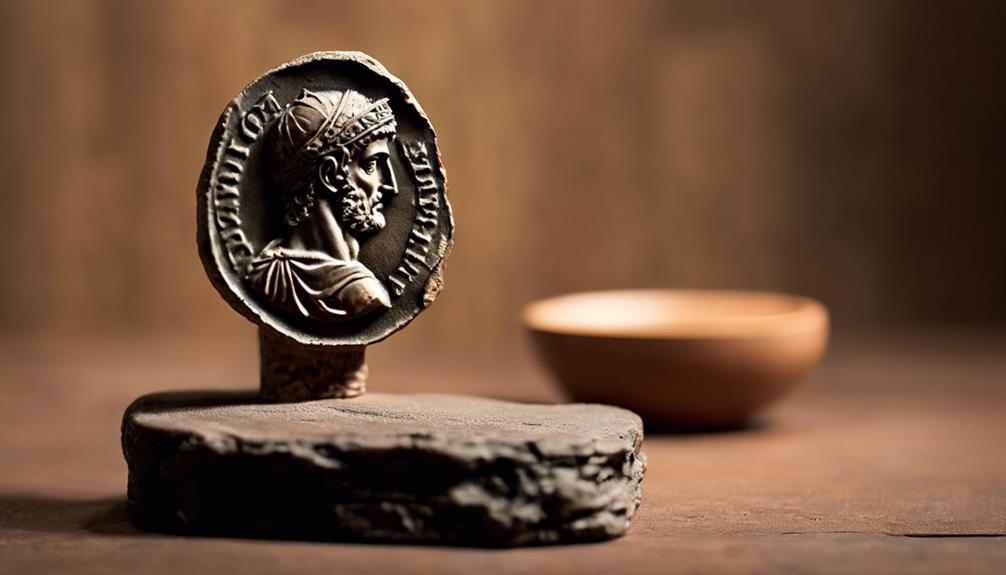Explore the profound impact of biblical figures starting with 'P' on faith and ethics, uncovering stories of transformation, wisdom, and moral dilemmas.

P Names in the Bible
If you've ever dipped your toes into the vast sea of biblical narratives, you're likely aware that names starting with 'P' have left an indelible mark on its storied pages. From Peter's unwavering faith to Paul's monumental transformation, these characters not only shaped the early Christian church but continue to influence modern spirituality and ethics.
You'll find that the legacy of Philip, the wisdom of Priscilla, and even Pontius Pilate's moral quandary offer layers of complexity and insight. As we explore these stories, you'll discover there's more beneath the surface, inviting you to uncover the profound impact these individuals have on contemporary interpretations of faith and morality.
Key Takeaways
- Biblical figures with 'P' names played pivotal roles in Christian narratives, including leadership, evangelism, and ethical dilemmas.
- 'P' names like Peter and Paul highlight significant transformations and contributions to the foundations of the Christian Church.
- Priscilla exemplifies the impact of mentorship and partnership in early Christian evangelism and community building.
- Pontius Pilate's story underscores the moral and political complexities faced by leaders, as depicted in biblical accounts.
The Story of Peter

In examining the biblical narrative, Peter emerges as a central figure whose transformation from Simon, a simple fisherman, to Peter, the 'Rock' upon which Christianity was built, encapsulates a profound journey of faith and leadership within early Christian history. This transformation is punctuated by pivotal moments of both failure and divine intervention, notably Peter's denial and his miraculous escape.
Peter's denial, occurring thrice before the rooster crowed, represents a moment of profound vulnerability and human frailty. It's a stark reminder of the complexities of faith, where even the most devoted can falter under fear and pressure. This episode not only highlights Peter's imperfections but also sets the stage for his redemption and underscores the theme of forgiveness that's central to Christian teachings.
Following his denial, Peter's miraculous escape from prison showcases divine intervention and the fulfillment of Jesus' prophecy that Peter would be the foundation of the Church. This event marks a turning point, reinforcing his role as a leader among the apostles and exemplifying the power of faith to overcome seemingly insurmountable obstacles. Through these critical episodes, Peter's story offers a nuanced exploration of faith, leadership, and redemption.
Paul's Transformation

Just as Peter's journey reflects a profound transformation within the early Christian narrative, Paul's own metamorphosis from Saul of Tarsus, a fervent persecutor of Christians, to a pivotal apostle of Jesus Christ, unveils another layer of complexity and depth in understanding faith's power to redefine identity and purpose.
Saul's conversion on the Damascus road isn't merely a tale of personal change but a cornerstone of Christian theology, illustrating the profound impact of divine intervention and the boundless capacity for redemption.
Before this pivotal event, you observe Saul as a staunch advocate of Jewish law, participating actively in the persecution of early Christians. His journey to Damascus, intent on arresting more Christians, symbolizes his peak of opposition to the Christian faith. However, the Damascus road experience, where he's blinded by a divine light and hears the voice of Jesus questioning his persecution, marks the inception of his transformation. This encounter doesn't just alter his name to Paul but reshapes his entire theological and existential outlook.
Paul's subsequent ministry, characterized by tireless preaching, missionary journeys, and extensive epistles, showcases a radical shift in identity and purpose. His transformation underscores the theme that faith possesses the profound capability to alter one's life trajectory, emphasizing the dynamic and transformative power of belief and divine calling.
The Legacy of Philip

Exploring the legacy of Philip reveals a multifaceted impact on the early Christian community, demonstrating his crucial role in the expansion and diversification of the faith. His appointment during the Deacon selection marked a pivotal moment, signifying the church's commitment to addressing the practical needs of its growing body while freeing apostles to focus on preaching. Philip's miracles further solidified his influence, evidencing the power of faith and the Holy Spirit's work through believers.
Aspect |
Impact |
|---|---|
Deacon Selection |
Symbolized the church's structural evolution and focus on communal care. |
Philip's Miracles |
Demonstrated the tangible presence of God's power, encouraging faith among early Christians. |
Evangelism |
Paved the way for the gospel's spread beyond Jewish communities. |
Unity and Diversity |
Fostered a broader inclusivity within the early church, embracing different cultures and backgrounds. |
Philip's evangelistic journeys, notably to Samaria and the encounter with the Ethiopian eunuch, were instrumental in breaking down ethnic and religious barriers, setting a precedent for a more inclusive Christian mission. His legacy, therefore, isn't just in the miraculous but in his profound contribution to the church's growth and diversification, embodying the essence of servant leadership and cross-cultural evangelism.
Priscilla in the Early Church

Priscilla, alongside her husband Aquila, played a pivotal role within the early church, exemplifying the remarkable influence lay members could exert on the spread and deepening of Christian teachings. Their contributions weren't merely supportive but transformative, setting foundational stones for the burgeoning Christian community. Through Priscilla's mentorship and Aquila's partnership, they embodied a duo of spiritual and educational prowess, navigating the complexities of early Christian evangelism with grace and effectiveness.
Analyzing Priscilla's impact, three key areas emerge:
- Mentorship: Priscilla's role extended beyond traditional expectations, as she became a mentor to many, including Apollos. Her guidance was instrumental in refining Apollos' understanding of the gospel, showcasing her deep theological insight and the respect she commanded within the early church.
- Hospitality: Their home became a center for Christian fellowship and teaching. This open-door policy facilitated the spread of Christian ideas, highlighting the importance of community and support in faith's growth.
- Partnership: Priscilla and Aquila's partnership was a testament to their mutual commitment to spreading the Christian faith. Their collaborative efforts underscored the potential of lay members to significantly contribute to theological discourse and evangelism.
Pontius Pilate's Dilemma

Pontius Pilate, the Roman governor of Judea, faced a profound ethical and political quandary when tasked with adjudicating the fate of Jesus of Nazareth. This pivotal moment in history encapsulates a complex interplay of judgment ethics and the enduring historical impact of Pilate's decision. Pilate found himself at the intersection of Roman law, Jewish religious authority, and personal conviction, navigating a situation fraught with potential repercussions both immediate and far-reaching.
Your examination of this dilemma reveals Pilate's attempt to balance the demands of justice with the pressures of maintaining peace and order. He engaged in a process of deliberation that highlights the challenges inherent in positions of authority, where decisions carry weight beyond the immediate context. Pilate's actions, including his notorious hand-washing gesture, have been interpreted as a symbolic relinquishment of responsibility, yet they also underscore the complexities of moral and political accountability.
The historical impact of Pilate's decision is profound, influencing not only the course of Christian history but also the broader discourse on leadership, justice, and the ethical responsibilities of those in power. This episode serves as a compelling case study in the dilemmas of governance and the enduring questions of judgment ethics.
The Parable of Philemon

While the Bible is replete with narratives that challenge the moral compass, the Parable of Philemon offers a unique exploration into themes of forgiveness, reconciliation, and the transformative power of grace within the early Christian community. This narrative delves deeply into the dynamics between a slave, Onesimus, and his master, Philemon, presenting a profound commentary on the Christian ethos of love transcending societal norms.
In analyzing the Parable of Philemon, you'll find:
- The Forgiveness Theme: Central to the narrative is the appeal for Philemon to forgive Onesimus, not merely as a slave but as a brother in Christ. This theme challenges readers to reconsider their own capacity for forgiveness.
- Slave Master Dynamics: The relationship dynamics between Philemon and Onesimus underscore the revolutionary Christian notion that all individuals, irrespective of social status, are equal in the eyes of God.
- Community Reconciliation: The letter to Philemon isn't just a personal communication; it's a call for the wider Christian community to embrace forgiveness and reconciliation, setting a precedent for resolving conflicts.
This parable, then, isn't just a story; it's a reflection on the radical nature of Christian love and forgiveness, urging readers to transcend societal boundaries in favor of a more inclusive and compassionate community.
Frequently Asked Questions
How Does the Significance of Names Starting With 'P' in the Bible Compare to Names Starting With Other Letters in Terms of Theological Themes or Character Traits?
You're exploring how names influence character traits and theological themes. Names starting with 'p' often carry significant weight in these discussions. They're not just phonetic symbols; they embody patriarchal psychology, reflecting societal structures and individual roles within biblical narratives.
Compared to other letters, 'p' names might offer unique insights into leadership, spirituality, and morality. Analyzing these names reveals deeper layers of meaning, enhancing our understanding of biblical characters and their stories.
Are There Any Lesser-Known Biblical Figures With Names Starting With 'P' Who Played Pivotal Roles in Less Prominent Stories or Parables?
You mightn't realize it, but lesser-known figures like Phoebe and Pontius Pilate have stories that weave through biblical narratives, almost like hidden threads in a tapestry.
Phoebe's contributions to the early church, for instance, highlight the significant yet often overlooked roles women played.
Meanwhile, Pontius Pilate's dilemma showcases the complex interplay of political and moral decision-making.
These characters add depth and nuance to our understanding of biblical themes.
How Do Modern Biblical Scholars Interpret the Symbolic Meanings or Etymologies of Biblical Names Starting With 'P' in the Context of Ancient Hebrew, Greek, or Roman Cultures?
You're diving into how scholars decode the meanings of names, focusing on phonetic analysis within ancient cultures. They meticulously trace name popularity trends, connecting dots between linguistic nuances and historical contexts.
Through this lens, you understand names as more than labels; they're windows into societal values, personal identity, and even destiny. This approach reveals the layered complexity of ancient texts, offering insights into the cultures that cherished these names.
In What Ways Have the Stories of Biblical Characters With Names Starting With 'P' Influenced Christian Liturgy, Art, or Literature Throughout History?
You're exploring how stories of certain biblical characters have shaped Christian traditions.
Specifically, Paul's journeys have inspired countless works, highlighting the spread of Christianity and emphasizing missions.
Similarly, Peter's denial has been a focal point in art and literature, often symbolizing human frailty and redemption.
These narratives have deeply influenced Christian liturgy, with their lessons woven into prayers, hymns, and sermons, showcasing their enduring impact on faith and culture.
Can the Naming Conventions or the Prevalence of Certain Initial Letters, Such as 'P', in Biblical Names Tell Us Anything About the Socio-Political or Religious Landscape of the Times in Which These Texts Were Written?
Absolutely, the prevalence of certain initials in names can provide insights into the era's socio-political or religious contexts. By exploring personal identity through phonetic analysis trends, you'll notice how these patterns reflect broader societal norms and beliefs.
This method of examination doesn't just apply to 'P' but can significantly reveal the historical and cultural significance behind naming conventions, offering a detailed, scholarly look into the fabric of ancient communities.
Conclusion
In analyzing the tapestry of biblical narratives, one can't overlook the threads woven by characters whose names begin with 'P.' Like stars in a constellation, each offers guidance and illumination in the spiritual firmament.
Consider Peter, whose transformation from fisherman to foundational rock of the church mirrors the metamorphosis of raw ore into precious metal through divine alchemy. This scholarly exploration reveals not just historical figures, but archetypes that continue to shape our collective spiritual and ethical landscape, demonstrating the enduring power of these ancient stories.



Sign up